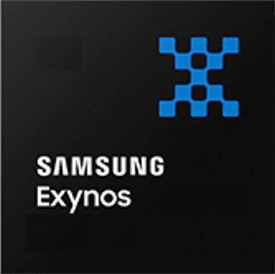
Samsung Exynos 880 Benchmark, Test and specs
Last updated:
The Samsung Exynos 880 has 8 CPU cores and can process 8 threads at the same time. The processor was presented in Q2/2020 and is based on the 4. Generation of the Samsung Exynos series. In the Geekbench 5 benchmark, the Samsung Exynos 880 achieved a result of 645 points (single-core) or 1,830 points (multi-core).

| Name: | Samsung Exynos 880 |
|---|---|
| Family: | Samsung Exynos (46) |
| CPU group: | Samsung Exynos 800 (2) |
| Architecture: | Cortex-A77 / Cortex-A55 |
| Segment: | Mobile |
| Generation: | 4 |
| Predecessor: | -- |
| Successor: | -- |
CPU Cores and Base Frequency
The Samsung Exynos 880 has 8 cores. The clock frequency of the Samsung Exynos 880 is 2.00 GHz. An initial performance assessment can be made using the number of CPU cores.
| CPU Cores / Threads: | 8 / 8 |
|---|---|
| Core architecture: | hybrid (big.LITTLE) |
| A-Core: | 2x Cortex-A77 |
| B-Core: | 6x Cortex-A55 |
| Hyperthreading / SMT: | No |
|---|---|
| Overclocking: | No |
| A-Core Frequency: | 2.00 GHz |
| B-Core Frequency: | 1.80 GHz |
Internal Graphics
The Samsung Exynos 880 has an integrated graphics that the system can use to efficiently play back videos. The Samsung Exynos 880 has the ARM Mali-G76 MP5 installed, which has 5 streaming multiprocessors (80 shaders).
| GPU name: | ARM Mali-G76 MP5 |
|---|---|
| GPU frequency: | 0.72 GHz |
| GPU (Turbo): | 0.72 GHz |
| Compute units: | 5 |
| Shader: | 80 |
| Hardware Raytracing: | No |
| Release date: | Q3/2018 |
| Max. displays: | 2 |
|---|---|
| Generation: | Bifrost 3 |
| Direct X: | 12 |
| Technology: | 7 nm |
| Max. GPU Memory: | 4 GB |
| Frame Generation: | No |
Hardware codec support
Processors with integrated graphics can process video codecs faster. Support for modern codecs can significantly increase system efficiency during video playback.
| h265 / HEVC (8 bit): | Decode / Encode |
|---|---|
| h265 / HEVC (10 bit): | Decode / Encode |
| h264: | Decode / Encode |
| VP8: | Decode / Encode |
| VP9: | Decode / Encode |
| AV1: | No |
|---|---|
| AVC: | Decode / Encode |
| VC-1: | Decode / Encode |
| JPEG: | Decode / Encode |
Memory & PCIeThe Samsung Exynos 880 supports a maximum of memory. Depending on the mainboard, the processor can use a maximum of 0 memory channels. This results in a maximum bandwidth of the main memory of --. |
|
| Memory type: | Memory bandwidth: |
|---|---|
| LPDDR4X | -- |
| Max. Memory: | |
| Memory channels: | 0 |
| ECC: | No |
| PCIe: | |
| PCIe Bandwidth: | -- |
Thermal ManagementThe Samsung Exynos 880 has a TDP of . Based on the TDP, the system manufacturer can and must adapt the cooling solution to the processor. |
|
|---|---|
| TDP (PL1 / PBP): | |
| TDP (PL2): | -- |
| TDP up: | -- |
| TDP down: | -- |
| Tjunction max.: | -- |
Technical details
Modern production reduces the waste heat of a processor and increases its efficiency. The Samsung Exynos 880 is made in 8 nm and has 0.00 MB cache.
| Technology: | 8 nm |
|---|---|
| Chip design: | |
| Socket: | -- |
| L2-Cache: | -- |
| L3-Cache: | -- |
| AES-NI: | No |
| Operating systems: | Android |
| Virtualization: | None |
|---|---|
| Instruction set (ISA): | Armv8-A (64 bit) |
| ISA extensions: | -- |
| Release date: | Q2/2020 |
| Release price: | -- |
| Part Number: | -- |
| Documents: | Technical data sheet |
Rate this processor
Benchmark results

The benchmark results for the Samsung Exynos 880 have been carefully checked by us. We only publish benchmark results that have been created by us or that have been submitted by a visitor and then checked by a team member. All results are based on and fullfill our benchmark guidelines.
Geekbench 5, 64bit (Single-Core)
Geekbench 5 is a cross plattform benchmark that heavily uses the systems memory. A fast memory will push the result a lot. The single-core test only uses one CPU core, the amount of cores or hyperthreading ability doesn't count.

|
Intel Xeon E7-4880 v2
15C 30T @ 3.10 GHz |
||

|
MediaTek Kompanio 820
8C 8T @ 2.20 GHz |
||

|
MediaTek Dimensity 820
8C 8T @ 2.60 GHz |
||
|
|
Samsung Exynos 880
8C 8T @ 2.00 GHz |
||

|
Intel Core i5-3210M
2C 4T @ 3.10 GHz |
||

|
Qualcomm Snapdragon 750G
8C 8T @ 2.20 GHz |
||

|
Intel Core i7-3537U
2C 4T @ 3.10 GHz |
||
Geekbench 5, 64bit (Multi-Core)
Geekbench 5 is a cross plattform benchmark that heavily uses the systems memory. A fast memory will push the result a lot. The multi-core test involves all CPU cores and taks a big advantage of hyperthreading.

|
AMD FX-6120
6C 6T @ 4.10 GHz |
||

|
AMD Athlon X4 845
4C 4T @ 3.80 GHz |
||

|
Intel Core i5-2500T
4C 4T @ 2.30 GHz |
||
|
|
Samsung Exynos 880
8C 8T @ 2.00 GHz |
||

|
Intel Core i7-860S
4C 8T @ 2.53 GHz |
||

|
AMD A12-9800
4C 4T @ 3.80 GHz |
||

|
Intel Core i7-7500U
2C 4T @ 3.50 GHz |
||
iGPU - FP32 Performance (Single-precision GFLOPS)
The theoretical computing performance of the internal graphics unit of the processor with simple accuracy (32 bit) in GFLOPS. GFLOPS indicates how many billion floating point operations the iGPU can perform per second.

|
AMD A6-4400M
AMD Radeon HD 7520G @ 0.69 GHz |
||

|
AMD A8-7100
AMD Radeon R5 (Kaveri) @ 0.51 GHz |
||

|
AMD A8-7150B
AMD Radeon R5 (Kaveri) @ 0.51 GHz |
||
|
|
Samsung Exynos 880
ARM Mali-G76 MP5 @ 0.72 GHz |
||

|
MediaTek Helio G95
ARM Mali-G76 MP4 @ 0.90 GHz |
||

|
Samsung Exynos 980
ARM Mali-G76 MP5 @ 0.72 GHz |
||

|
Intel Core i7-2700K
Intel HD Graphics 3000 @ 1.35 GHz |
||
AnTuTu 8 Benchmark
The AnTuTu 8 Benchmark measures the performance of a SoC. AnTuTu benchmarks the CPU, GPU, Memory as well as the UX (User Experience) by simulating browser and app usage. AnTuTu can benchmark any ARM CPU that runs under Android or iOS. Devices may not be directly compareable if the benchmark has been performed under different operating systems.
In the AnTuTu 8 benchmark, the single-core performance of a processor is only slightly weighted. The evaluation consists of the multi-core performance of the processor, the speed of the RAM and the performance of the internal graphics.
In the AnTuTu 8 benchmark, the single-core performance of a processor is only slightly weighted. The evaluation consists of the multi-core performance of the processor, the speed of the RAM and the performance of the internal graphics.

|
Apple A11 Bionic
6C 6T @ 2.39 GHz |
||

|
Qualcomm Snapdragon 765
8C 8T @ 2.30 GHz |
||

|
Qualcomm Snapdragon 690 5G
8C 8T @ 2.00 GHz |
||
|
|
Samsung Exynos 880
8C 8T @ 2.00 GHz |
||

|
MediaTek Dimensity 7200
8C 8T @ 2.80 GHz |
||

|
MediaTek Dimensity 720
8C 8T @ 2.00 GHz |
||

|
MediaTek Helio G90T
8C 8T @ 2.05 GHz |
||
Benchmarks

Geekbench 5 (SC)
2,488 entries
2,488 entries

Geekbench 5 (MC)
2,461 entries
2,461 entries

FP32 SP (iGPU)
2,042 entries
2,042 entries

AnTuTu 8 Benchmark
118 entries
118 entries
Popular comparisons
back to index





